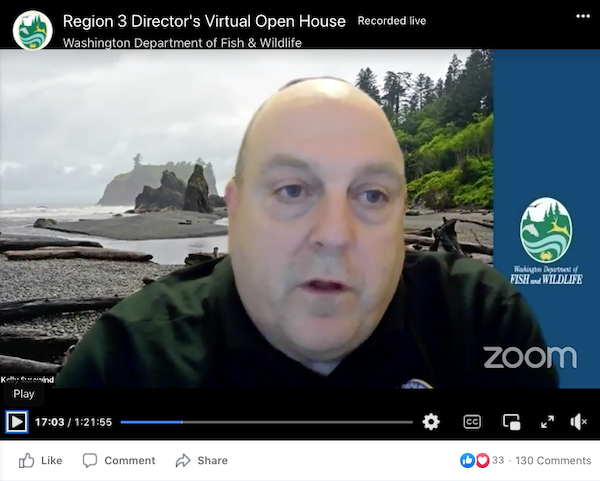
WDFW Director Confident Spring Bear Hunt Only Paused
WDFW Director Kelly Susewind is expressing confidence that Washington’s limited-entry spring black bear hunt is only facing a one-year pause and said that he and his staff will be “working our butts off” to keep it that way.
“We think it’s a good opportunity. We think the population can sustain it, so we’ll be continuing to work towards a [2023] season next year,” he said last night during a regional virtual open house focusing on Southcentral Washington and carried over Facebook.

Even as the Fish and Wildlife Commission’s November 19 tie vote that cancelled the 2022 season continues to roil rank-and-file Evergreen State hunters, what I gather behind the scenes from some is to keep our powder dry in the near term, the more effective thrust in reinstating the hunt will come next summer and fall as the 2023 proposal works its way toward a vote by the citizen panel.
In the meanwhile, Susewind offered his take Tuesday evening on what had just happened and the path forward in comments that begin at the 16:06 mark:
“The agency recommended to our commission to proceed with the 2022 spring bear season. It’s something we’ve been doing for a long time,” he said.
“A lot of question, a lot of controversy around that hunt. It’s been growing over the last few years. The commission got a lot of negative feedback on that hunt.
“Currently the rules allow for the hunt that just occurred this past year, 2021. It’s silent to 2022. I’ll go into a little detail because I get asked this question all the time. That means we have to propose a hunt and we have to have an affirmative approval of that hunt to move forward.
“We proposed that [2022] hunt and it was a 4-4 tie, and so that means we do not have affirmative approval to move forward with a new hunt. The existing hunt is already over, so that basically means there’s nothing on the books for 2022. That tie vote means will we not be having the spring bear season in 2022.
“I think it’s important to note that the commissioners were asking for additional information – population status. We’re working already with the commission to make sure we can answer any unanswered questions that they may have.
“The vote was an up-or-down vote, yes or no, and the vote went no because of the tie. But all the dialogue around that was a pause for commissioners to get better vetted in what’s going on, understand the data, for us to provide more science to them.
“I’m confident it’s a pause. We’re going to be working our butts off on the agency side to keep it as a pause. Very unfortunate for 2022, but we’re going to put a lot of energy into getting that hunt back in 2023.
“Of course that requires commission approval, but I think we have solid answers to the questions. We think it’s a good opportunity, we think the population can sustain it, so we’ll be continuing to work towards a season next year,” Susewind said.
The makeup of the commission could always be different by then – there’s a long-empty Eastern Washington seat for the Governor’s Office to fill – but the panel last week retained Larry Carpenter as the chair. He was the decisive fourth no and maintains his vote was based on not-unfounded litigation fears and wanting to put the hunt on even firmer scientific ground. They also promoted Douglas County’s Molly Linville to vice chair, a yes vote on spring bears.
And after the commission heard from hunters earlier in their monthly meeting, member Kim Thorburn, another yes vote, indicated that the issue would be on the table of her Wildlife Committee in the coming months.
The commission’s working 2022 “year at a glance” calendar shows spring bear pencilled in for a briefing and public hearing before the full panel September 22-24 in Clarkston, with a decision expected in October.
But bears aren’t the only Washington predators making the news lately.
Blue Mountains elk-cougar issues were a 10-plus-minute topic on Seattle station KIRO Radio 97.3 on Tuesday afternoon.
Dori Monson had Tom Nelson, host of The Outdoor Line on 710 ESPN, on to discuss the “exceptionally low” calf survival rates that are “challenging the very survival of this herd of elk” and what some commissioners apparently want to do about it instead of addressing the key predator, mountain lions: reduce hunter harvest even further and lower state wildlife biologists’ herd population management objective.
It’s another illustration that the future of Washington critter management is at a critical point. Even if Susewind maintains commissioners are just looking for “additional information,” their likely agendas are being cloaked behind population concerns, ethics and values arguments.
And a deer hunter reported killing two wolves at 18 and 30 yards with a bow and arrow northwest of Spokane earlier this week. He said he was hunting on the Spokane Reservation, one of two reservations in Eastern Washington where wolf hunts are held.

